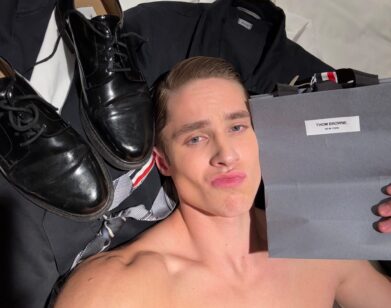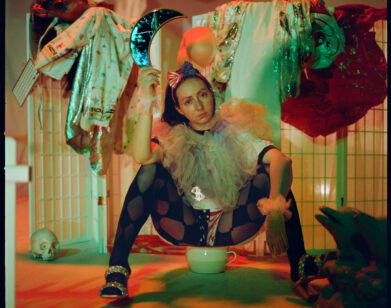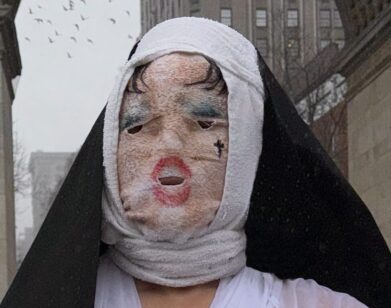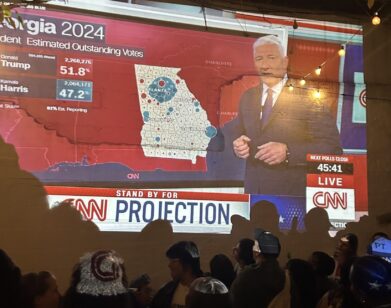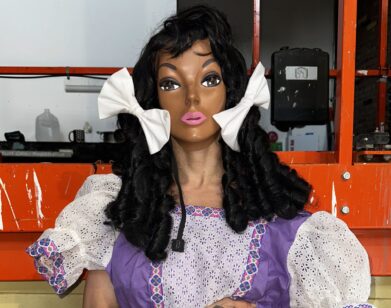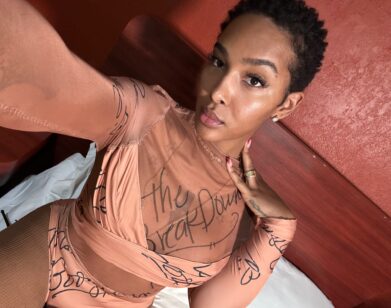SMOKE BREAK
“Very Demure, Very Mindful”: A Ten-Minute Cig With Performer Nile Harris
SATURDAY 11:11 PM AUGUST 10, 2024 CHINATOWN
Last weekend, for the latest installment of Smoke Break, we lit up a string of cigarettes with artist Nile Harris, who brought avant-garde back to the theater with his autofictional play minor b, a sold-out show which ran for two days at The Shed in Hudson Yards. “It’s about horniness, it’s about madness, it’s sludging through the discourse of gay sex New York,” exclaimed Harris, who last graced our pages in the Summer 2023 issue. After watching he and his motley crew of characters chain-smoke, pee onstage, and rip lines of ketamine, exciting the audience into a metaphorical K-hole of its own, we tracked him down back at his studio in Chinatown to get down to the nitty-gritty. As Crackhead Barney serenaded us with her DJ set, we lit up some Marlboros and mused over a few existential riddles, such as: “Can the revolution be funded?” and “Can a slave top?”
———
LILY KWAK: What are you smoking?
NILE HARRIS: I’m smoking Marlboro Lights.
KWAK: Is that your go-to?
HARRIS: It is, but I’m really trying to quit. I promised myself that after this play I wouldn’t smoke anymore.
KWAK: How are you feeling about your show?
HARRIS: I’m feeling really good. There’s moments in my life where I don’t have faith in myself, but something that I love about working with ensembles is that I have so much faith in the people who I work with every night.
KWAK: There’s a moment in your play where you say, “Can a slave be a top?” Can you explain?
HARRIS: That’s my line that I threw in there. It’s like, “Yes, Black people can top, but ontologically speaking, who has the power, really?” Even if you’re doing the penetration, I think a slave is always in a position of subjugation, and it’s always philosophically bottoming, even if they’re doing the insertion. It’s an oxymoron.
KWAK: How was the process of putting together this show?
HARRIS: It was really fun. Most of it was getting to know the weirdos that I brought in to work with me. I work so site-specifically and improvisationally, so it’s just trying to understand the quirks of the people who are in the room with me. We were at my studio, and in 99 Canal right now, just us in this hot-ass room with no air-conditioning doing weird improvised tasks with microphones.
KWAK: Beautiful. Your show was staged in The Shed, in Hudson Yards, which is a massive gentrification project.
HARRIS: Yes.
KWAK: How do you negotiate that history as an artist?
HARRIS: I just fall victim to it in many ways. When Hudson Yards was built, it took a tax zoning law from Harlem, so there’s a small strip of land that goes from Harlem all the way down to the Hudson Yards, and that’s how they got their tax breaks. It’s a completely fake city that just kind of popped out of nowhere.
KWAK: A billionaire’s fantasy city.
HARRIS: Exactly. So in that way, it felt like an apt site to make fun of. And considering all of the suicides at the Vessel, which is super sad, and a ripe metaphor for capitalism at its worst, which made a very fun sort of victim of fodder to talk about. It’s just the worst of capitalism, and The Shed is a part of that system.
KWAK: Can the revolution be funded?
HARRIS: No. You can’t do anything radical inside of those frames. I’ve given up long ago on trying to do something that’s truly radical inside of the liberal nonprofit frame. I don’t think it’s possible, and yet I still try. Maybe people can call me out for that. I don’t think anything I’m doing is that radical. Audre Lorde has this quote, “The master’s tools can never dismantle the master’s house,” and I feel very much victim to that. As much as I try to critique, critique, critique, at the end of the day I decided to cash the check.
LILY: Cash that check.
HARRIS: You cash a check and then you break all the rules. That’s how I chose to do it. I understood the conditions that I was brought in on, but I had to try as hard as I could to make my work with integrity. I got in a lot of trouble, and they were not the most happy with me, but the ongoing question in my practice is about keeping integrity while dancing with the devil.
KWAK: It must have been interesting to perform to the audience that you did.
HARRIS: Yeah, this is the whitest crowd I’ve played to in my life. And it’s a very institutional, bureaucratic space, so both those things definitely fall into the frame. I’m trying to bring an improvised candor to a space that the space doesn’t want to hold. And I think that’s the question of the play: “How do you show up in the face of circumstances that are unfavorable to you?” And yet, we do. Because so many other Black artists across time have found ways to defy the odds and show up, even when they are not welcomed. And that is the conflict of the play. “How do you show up and bring your poetic Black improvised magic in the conditions that don’t want that?” That is the singular question of the play.
KWAK: Can you explain more of your sound choices in the show?
HARRIS: I really was inspired by this jazz cornetist named Buddy Bolden, from the early 19th century, who would sit inside the insane asylum, so I knew I wanted there to be an analog jazz sound to it. My sound designers play cornet and drums, and I played the clarinet when I was in elementary school. My last show was about my best friend who passed away, Trevor Brazil, and he was a saxophone player, so I felt some strange connection to him by playing another woodwind instrument. And then Kwame Winfield, my sound designer, is like a crazy improviser who makes every show sound different. It’s a fucked up sound scent mosh pit sort of vibe. I wanted it to be a mind fuck of a gesture towards jazz music, but then completely 21st century electric, and I’m hearing [Crackhead] Barney yelling her heart out in the background. It’s just the rage of it all. Really, the whole party is a carry. It’s set outside of a men’s bathroom at an after-hours party that goes on for too long. So in that sense, I wanted it to feel like a rage carry, but then with this strange thread of jazz music.
KWAK: And you’re very interactive with the audience because you’re inspired by the avant-garde white theatrical movement.
HARRIS: Yeah. In the project description, I did say it is my love letter to the white theatrical avant-garde of the early 2000s. And that’s actually a call towards my lead, Jim Fletcher, because he’s been a leading man for so many of these iconic theater productions of the early 2000s of companies like Richard Maxwell’s New York City Players or Elevated Repair Service or the Wooster Group. But in my stand-up practice, which is just me fucking around talking to the audience, I took some strange inspiration from Jerrod Carmichael, the stand-up comedian who was loving on white men on HBO in the most cringey ways. That gave me a dose of courage to be like, “Oh, I can be cringe too.” I’m also thinking about people like Keke Palmer, who’s like a millennial queen. I’ve never seen her do stand-up, but there’s a warmth and a humanity there that I really admire.
KWAK: I was so obsessed with your play. I came both nights, and I brought all my friends to come.
HARRIS: Thank you so much. That means so much because I actually was worried that the play wasn’t entertaining. I wanted to not make an entertaining play. I wanted it to be slow and monotonous. And there’s this viral TikTok sound right now like, “Very demure, very mindful.”
KWAK: Yes.
HARRIS: And that was very much the thesis. My work in the past has been very crapped-out clown theatricality, but I wanted it to be very restrained and kind of quiet. I felt like I was trying to do something new that I’ve never done before. But I’m so grateful to hear that you enjoyed it and you wanted to see it again. The cast is so good. That’s what kind of anchors it all for me. Each night they’re saying something different. And that’s what keeps me coming back as a viewer like, “What the fuck are these people going to say tonight?”
KWAK: I felt like I was spiraling into madness by the end of your show.
HARRIS: Yeah, it ends in a K-Hole. Like, the scene where everyone is hanging out for 10 minutes and you’re like, “Did they forget they’re doing a play? Like, did they forget about us?” It’s purposely meant to be this moment where the play falls apart and we’re just hanging out with each other. And you just have to watch us chain-smoke and do lines of ketamine and like, hang out. And you’re like, “Am I supposed to be watching this? This is bad.”
KWAK: What was that moment when the white Board Member begins to crawl across the stage after reading through a torrent of Grindr messages?
HARRIS: It was Sniffies, which has this public chat feature where you can talk to everyone citywide. It’s like a message board, where you can share sex ads across the city. And he reads those live every day from the theaters, we don’t script it, he’s just reading whatever the horny boys in New York have to say. And so, in that way, it feels like a subplot in the play. It’s about horniness, it’s about madness, it’s sludging through the discourse of gay sex New York.
KWAK: I also loved how you ended it, because it was almost like you were going to end the same as how you began the play. But you changed it.
HARRIS: Yeah.
KWAK: Why did you decide to do that?
HARRIS: I think I always had this image of—another cig? Does anyone have a cigarette?
KWAK: I have a rogue cigarette.
HARRIS: For the ending, there’s a joke inside of the play, a small line that kind of gets buried, where I’m crying like Timothée Chalamet at the end of Call Me by Your Name.
KWAK: Right.
HARRIS: There’s a moment where he’s sitting by the fire escape and he’s just losing his cool, and he’s crying because he’s been so heartbroken. So that kind of resonated with me, and I wanted this moment where the actor who was playing me was having that full breakdown moment of love gone wrong. And simultaneously with this crying moment, a character is peeing on stage. In the earlier version of the show, the characters were sitting in a puddle of pee, crying together. It’s sort of just lovers holding each other. I felt like there’s no better way to end than the truth of the pain of love. I consider myself a director, performer, and all the things, but in my heart, I’m a dancer in many ways. So there’s no words, you have to just do this choreographic task of holding each other. I think so much about repetition and revision in my work, and in that sense, it’s like we’re repeating the beginning of the play, but then I’m making a revision to these lovers holding each other. Maybe that image is worth a thousand words, as they say. Maybe that’s all she wrote.
KWAK: That’s beautiful.
HARRIS: That’s an ending line. I’ll tell you the rest off the record.



